Hey there!
As I was checking my Substack, I realised there are 600 subscribers! Wow! That’s surreal. Maybe, (just maybe), I will start being more regular now.
However, you should know that the reason for my irregularity in the last two months was my internship over the summer. I was working as an intern with NDTV, and you can read about my first on-air story here.
This internship with NDTV was transformative, especially since this year's parliamentary elections marked my debut as an eligible voter in the national context. For the first time, I had the opportunity to actively participate in the democratic process while gaining a deeper understanding of the political climate of our country.
Last November, I wrote about my experience voting for the first time in the Telangana state assembly elections. I took part in the India Today Round Table on Telangana Elections, which made me more in touch with politics and helped me vote as responsibly as I could. That was the start of my interest in the intersection of politics and media. After I visited Sri Lanka for the Youth Forum Leadership Summit inspired by other young leaders, I reached out to Mrs. Uma Sudhir, the executive editor of the South Indian division of NDTV whose work I had greatly admired and who I had a pleasure to meet twice before. As a media student and a first-time voter, this internship felt like the perfect combination to appreciate and contribute to a news channel fully. It was once in 5 years, when the elections occurred and what better time for a college student and first-time voter for me to have this experience because I truly think I wouldn’t otherwise. Fortunately for me, Mrs. Uma Sudhir was kind enough to provide me with the opportunity. It allowed me to see the election process from both the perspective of a citizen and a budding journalist. Studying TV production in college last semester, and making our own news bulletin only sparked my interest, making it thrilling to step into the real world of television. This hands-on experience in a newsroom brought the theories and techniques I learned in class to life and also made me realise, that I never truly understood how it works until I applied it in the internship. Mind you, I had written my end semester too by then.
The internship was a fascinating experience. Although I've always been somewhat political, it has never been my primary interest. I followed the news, but not religiously. This has changed. I now feel much more aware of how media functions and its powerful role in shaping public opinion. I am more sensitive to news and current affairs. I make it a point to understand it fully while before I would maybe see it on Instagram.
Seeing firsthand how stories are researched, developed, and broadcasted provided me with a comprehensive understanding of the media landscape. I think a lot of us look at the news when we are younger and imagine holding that microphone and delivering news live. The drama and the tensions of the newsroom depicted in various forms of films are so appealing. The glamour and the high drama of it all was such an appeal for so many people.
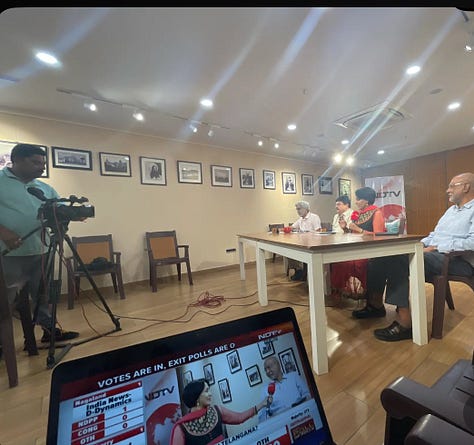

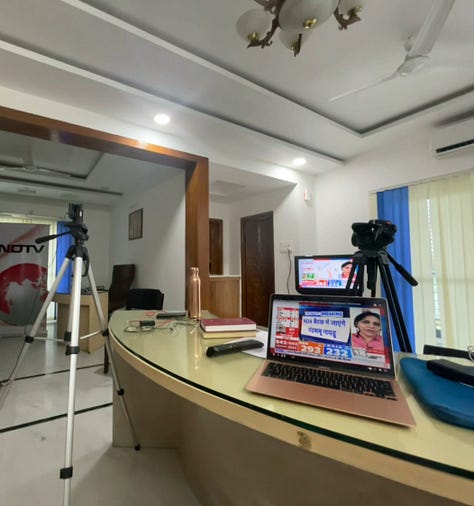
Surprisingly, the newsroom was far more grounded and less dramatic than I had anticipated. On-screen, journalists come across as perfect orators, but the meticulous craft and effort behind the scenes often go unnoticed. The skill required to conduct interviews, knowing exactly what to ask and when, is vastly underrated. Observing the off-camera work, I realized just how essential the camera crew's roles are. Their incredible skill often goes unnoticed, yet they possess similar instincts to journalists—an eye for news, a good story, and the ability to convey that story through visuals. In NDTV Hyderabad, the cameraman Nagaraju significantly helped me build confidence. His generosity with his time and patience during my first story was invaluable, offering me more trust and support than I could have ever asked for.
Another grounding experience was meeting people I had only seen on TV or in heated debates. Seeing journalists and politicians as regular humans, away from the cameras, was eye-opening. It was a reminder that there's more to them than their public personas. This insight made them more relatable and provided a new perspective on their work and lives. For instance, watching seasoned journalists prepare for their segments or seeing politicians in candid moments highlighted the immense preparation and thought that goes into public appearances. There's something special about watching this in real life.
Another notable observation was the stark underrepresentation of women in this field and among the audience. Coming from an all-girls college, where I'm constantly surrounded by women, this disparity in the real world was even more striking. Fortunately, I had the opportunity to work with an empowered senior woman journalist, which underscored the importance of representation. It is crucial for women to be present in these spaces for their voices to be heard. Women's perspectives on the world are unique and immensely valuable. It’s not just about women; people of all genders should have a platform in the media. The media reflects our society's climate, and its diversity should mirror that of the world we live in.

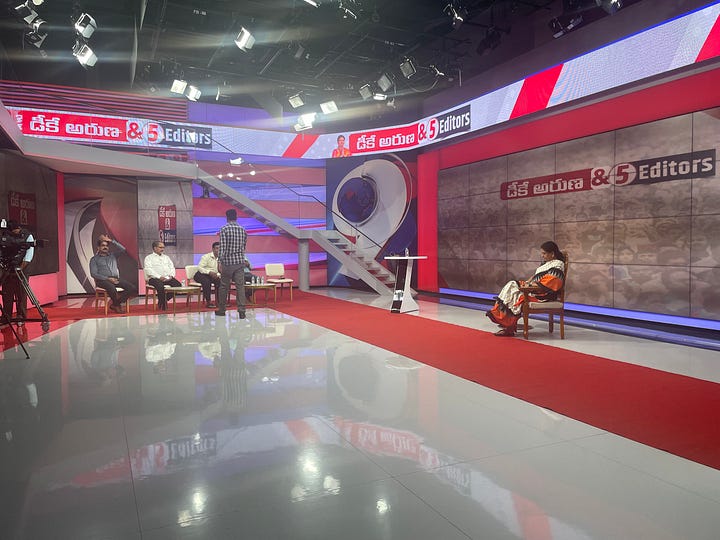

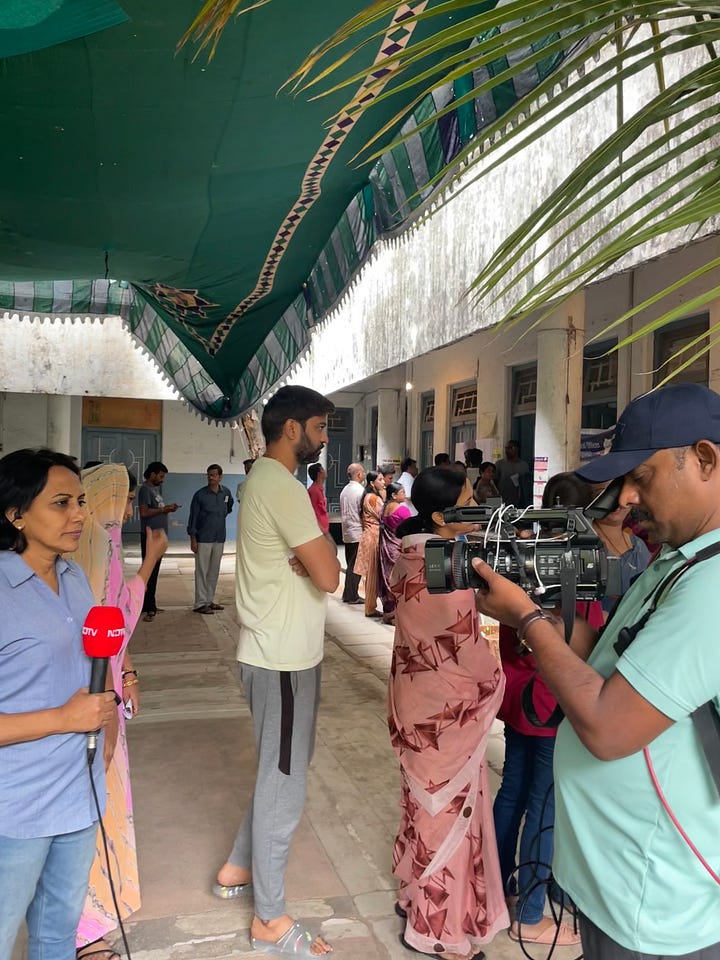
I gained a deep appreciation for journalists after this experience, yet I realised it's not a path I could pursue long term. The six weeks left me feeling burnt out, even though I was only knee-deep in the news. Still, this period opened my eyes to the profound impact media has on public discourse. However, it was disheartening to witness the clear biases and personal interests that often taint news coverage. As an enthusiast of media, I find the declining standards of news channels concerning.
In the world of journalism, while the error of omission is sometimes unavoidable, the error of commission is unacceptable. Providing half-baked information is detrimental, especially for news organizations that understand the power they hold in shaping public discourse. As the fourth pillar of democracy, news outlets must uphold their responsibility to deliver complete and accurate information. Failing to do so undermines their integrity and the public's trust, leading to misinformation and a misinformed populace. News organizations must commit to thorough fact-checking and comprehensive reporting, ensuring they present a full picture rather than fragments of the truth.
I previously discussed the importance of objectivity in journalism in my Grey Matters newsletter, and this experience has only reinforced that belief.
Our news consumption has been reduced to scrolling through catchy headlines, often devoid of the full story. Our eagerness for quick news has restricted our information as there is no further introspection. As I wrote in one of my previous newsletters, in today's digital age, where AI and editing tools can manipulate reality, the art of fact-checking is more crucial than ever, especially during elections. With individuals assuming the roles of journalists on platforms like Twitter, the phrase "don't believe everything you see" rings truer than ever.
This internship was a transformative experience for me. I spent most of my time absorbing information, often as a quiet observer, watching, learning, and trying to stay ahead of the curve. I asked countless questions, no matter how basic because I needed to understand the process fully. My media consumption habits shifted drastically; I spent less time on TV shows and YouTube and more on watching news channels for hours on end. Immersing myself in the news was both enlightening and overwhelming. The constant influx of new information was challenging to keep up with, but it was also a crash course in how news is reported and the importance of critical thinking and discernment in journalism. Fact-checking became second nature, as did staying updated and verifying information with sources. This experience taught me that in the news, timing is everything, and you must adapt quickly. The first half of my internship felt like a blur, a dream I was still waking up from.
The experience was intimidating. I had to unlearn preconceived notions and be open to making more mistakes than I was comfortable with. I hold myself to a high standard, so being thrown into the deep end was tough. I wasn't sure of my footing, but being at NDTV, a renowned news channel, gave me confidence. I still can't believe it when I talk about it. I took a leap, reached out, and before I knew it, I was over.
I've always known that a permanent career in a news organization might not be for me. However, this experience as a young voter, media student, and aspiring storyteller has been invaluable. It has opened my eyes to the complexities and responsibilities of journalism and its profound impact on society. This journey has been about growth, both personally and professionally, and it’s an experience I’ll always cherish.
Share your thoughts and perceptions about news and journalism in today's world. I would love to hear your comments, thoughts, and ideas about this newsletter in the comments below.

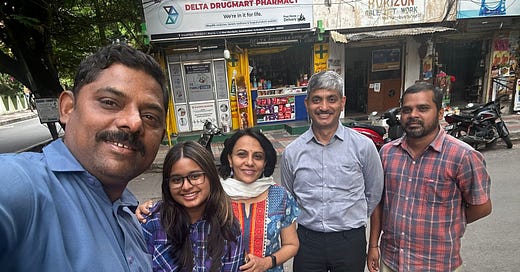



Wondering about inspiration for the title!
Seems like the NDTV internship was a big eye opener. Very interesting read.